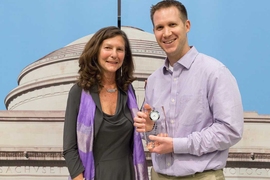Will Tisdale, the Charles and Hilda Roddey Career Development Professor in Chemical Engineering, has been honored as a Camille Dreyfus Teacher-Scholar, an award that recognizes and supports the research and teaching careers of talented young faculty in the chemical sciences.
Each of the 13 U.S. awardees is within the first five years of his or her academic career, and has created an outstanding independent body of scholarship spanning the broad range of contemporary research in the chemical sciences. Awardees must also have demonstrated a commitment to student instruction, particularly with undergraduates. As a Camille Dreyfus Teacher-Scholar, Tisdale receives an unrestricted research grant of $75,000.
“This is a tremendous honor given the past recipients list,” Tisdale says. “It is also particularly meaningful to me because it recognizes commitment to undergraduate education, which is a big focus of my professional life at MIT.”
Tisdale, 34, joined the Department of Chemical Engineering in January of 2012. The assistant professor's research program at the Tisdale Lab is focused on the development of colloidal semiconductor nanomaterials for use in next-generation energy technologies, and the use of ultrafast laser spectroscopy methods and advanced optical microscopy techniques for probing dynamics at the nanoscale.
Tisdale graduated magna cum laude from the University of Delaware in 2005, earning an honors BS in chemical engineering, with distinction, and minoring in economics. He earned a PhD in chemical engineering at the University of Minnesota in 2010, then studied as a postdoc under Vladimir Bulovic in the Research Laboratory of Electronics at MIT before joining the chemical engineering faculty.
He is a recipient of the Presidential Early Career Award for Scientists and Engineers, an Alfred P. Sloan Fellowship, the Department of Energy Early Career Award, the National Science Foundation CAREER Award, a 3M Non-Tenured Faculty Award, and MIT’s Everett Moore Baker Award for Excellence in Undergraduate Teaching.
The purpose of the Camille and Henry Dreyfus Foundation is to advance the science of chemistry, chemical engineering, and related sciences as a means of improving human relations and circumstances throughout the world. Established in 1946 by chemist, inventor, and businessman Camille Dreyfus as a memorial to his brother Henry, the foundation became a memorial to both men when Camille Dreyfus died in 1956. Throughout its history, the foundation has taken a leading role in identifying and addressing needs and opportunities to advance the chemical sciences.







